
Stella Artois is a pilsner beer, first brewed in 1926 by Brouwerij Artois in Leuven, Belgium. In its original form, the beer is 5.2 per cent ABV, the country's standard for pilsners. The beer is also sold in other countries including the UK, Ireland, Canada and Australia, where it has a reduced ABV. Stella Artois is owned by Interbrew International B.V. which is a subsidiary of the world's largest brewer, Anheuser-Busch InBev SA/NV.
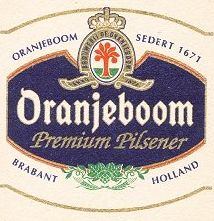
The Oranjeboom Brewery was founded in Rotterdam in 1671. The brewery there closed in 1990, with production shifted to Breda. That brewery was sold to Interbrew in 1995 and was closed in 2004 by InBev, Interbrew's successor. Production of the brand Oranjeboom was moved to the Dommelsch brewery. In October 2013, Oranjeboom was relaunched as a "quirky" new European style lager.

Duvel Moortgat Brewery is a Flemish family-controlled brewery founded in 1871 in Antwerp Province, Belgium. Its strong golden pale ale, Duvel, is exported to more than forty countries. Duvel is Brabantian, Ghent and Antwerp dialect for devil, the standard Dutch word being duivel. Other popular beers include Maredsous and Vedett.

Achel Brewery or Brouwerij der Sint-Benedictusabdij de Achelse Kluis was a Belgian Trappist brewery, until January 2021. It continues to operate as a brewery but is no longer Trappist, as the brewing monks whose presence gave rise to that status have retired. It is located in the Abbey of Saint Benedict in the Belgian municipality of Hamont-Achel.

Westmalle Brewery is a Trappist brewery in the Westmalle Abbey, Belgium. It produces three beers, designated as Trappist beer by the International Trappist Association. Westmalle Tripel is credited with being the first golden strong pale ale to use the term Tripel.

Beer in Belgium includes pale ales, lambics, Flemish red ales, sour brown ales, strong ales and stouts. In 2018, there were 304 breweries in Belgium, including international companies, such as AB InBev, and traditional breweries, such as Trappist monasteries. On average, Belgians drink 68 litres of beer each year, down from around 200 each year in 1900. Most beers are bought or served in bottles, rather than cans, and almost every beer has its own branded, sometimes uniquely shaped, glass. In 2016, UNESCO inscribed Belgian beer culture on their list of the intangible cultural heritage of humanity.

Palm Breweries is a brewery company. It owns several different Belgian breweries. Total production was 1,700,000 hl of beer in 2004. The brewery was a member of the Belgian Family Brewers society until 2016.
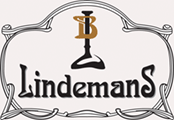
Lindemans Brewery is a Belgian family brewery based in Vlezenbeek, a small town in Flemish Brabant, southwestern Brussels. It produces lambics, a style of Belgian ale that uses raw wheat and wild yeast.

De Dolle Brouwers is a Belgian brewery, based in Esen in the province of West Flanders.
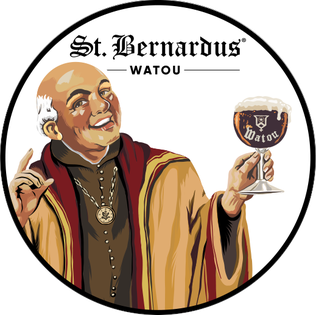
St. Bernardus is a brewery in Watou, Belgium.

Gulden Draak is a dark Belgian beer with high alcohol by volume (10.5%), brewed by Brouwerij Van Steenberge in Ertvelde, East Flanders. It is named after the golden dragon at the top of the belfry in Ghent.
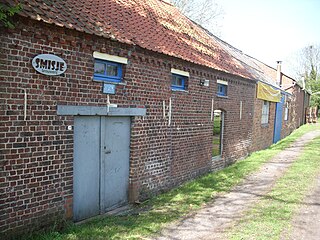
The Smisje Brewery, with a tiny production of only 200 hectoliters per year, is one of the smallest existing Belgian craft breweries. Begun in 1995 by former printer and homebrewer Johan Brandt, it was originally titled "De Regenboog", the same name as his earlier printing business. Brandt is also a bee-keeper, which accounts for the prominent use of honey in some of the brewery's offerings, including its first commercial beer, which was named 't Smisje or "the little blacksmith" to reflect the hand-crafted nature of the product as well as a local landmark blacksmith's house near the brewery's original location.

De Struise Brouwers is a microbrewery located in Oostvleteren, Belgium.
Hoegaarden Brewery is a brewery in Hoegaarden, Belgium, and the producer of a witbier, which is different from a wheat beer. Hoegaarden de-emphasizes hops, and is unfiltered, giving it the hazy, or milky, appearance--which makes it a wit (white) beer.
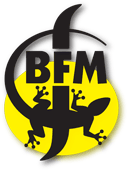
The Brasserie des Franches-Montagnes (BFM) is a small, artisanal brewery in Saignelégier, Jura, Switzerland, whose products, including barrel-aged beers, have drawn international acclaim. Founded in 1997 by Jérôme Rebetez, a trained oenologist, the brewery is known for making beers that stray outside traditional beer style guidelines and use unorthodox ingredients. The brewery takes its name from its home district.

Het Anker Brewery is a Flemish brewery in Mechelen, founded in 1471 by a community of Beguines. In 1872, the brewery was acquired by Louis Van Breedam, who renamed it Het Anker in 1904. Expanding its assortment from lager to ale, it began producing "Emperor beer" after World War II. In 1960, it renamed it "Gouden Carolus" after Charles V, Holy Roman Emperor. They opened a brasserie and a hotel, and in 2010 began producing a single malt whisky, distilled from the Gouden Carolus Tripel.
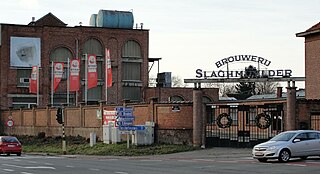
The Slaghmuylder Brewery is a small brewery in Ninove, Belgium. It was founded in 1860 and is still run by the same family.

Bosteels Brewery is a brewery in Buggenhout, Belgium. The brewery was founded in 1791 and was owned and operated by the same family. Bosteels brew three beers: Tripel Karmeliet, DeuS, and Pauwel Kwak. In 2019 a new beer was added for the first time in 17 years; Monte Cristo.
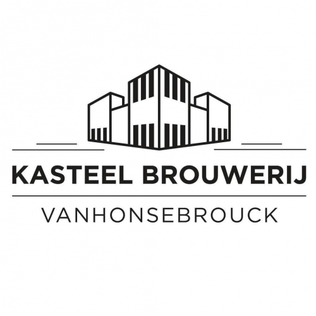
Van Honsebrouck is a Belgian brewery in Ingelmunster, Belgium. Founded in 1865 as Sint-Jozef Brewery, it was renamed to Brewery Van Honsebrouck in 1953. It is one of two breweries outside of Pajottenland to produce lambic beer.
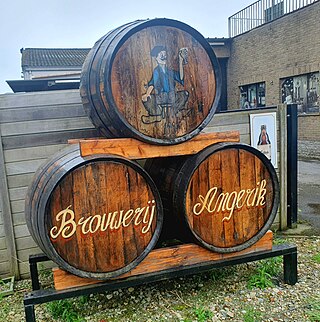
Brouwerij Angerik is a Belgian microbrewery located in the town of Dilbeek in the province of Flemish Brabant. They brew ales, lambic beers and a lager.
 .
.




















